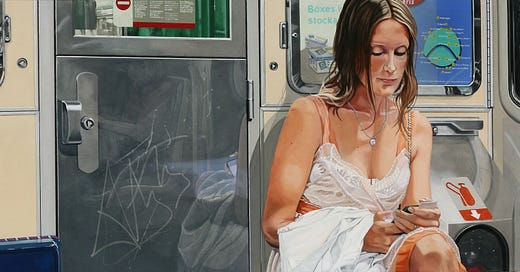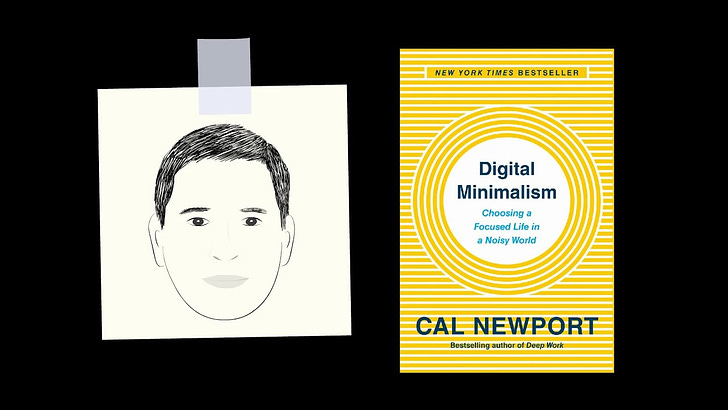A Permanent Goodbye to Social Media
and an acknowledgement that it isn't just about social media
A quick note: to those of you who showed up to Inspiration Station only to find no one there, I’m sorry! I cancelled via chat, but forgot to toggle the “send as email” button, as I usually do. I am currently reassessing Inspiration Station in the midst of a super-high workload and will be sending out a mid-week survey, so please look out for that.
If you’ve been with this newsletter since the beginning, you know that I write a lot about social media and its affect on me.
I used to be fully addicted to my phone, until I decided to change a bunch of settings (which I wrote about here) and turned my iPhone into what is now essentially a brick that texts and makes phone calls. I’ve written a lot about this addiction, both to my phone and social media. I recorded a little voice message about how I started noticing the ways I was addicted, which is included in this post. I also created this post:
When I first joined Twitter I was twenty-eight, without a college education, and an aspiring writer. Over the next ten years I made so many wonderful online friends and also had some exciting moments, like when Taye Diggs and Bradley Whitford followed me, and when writers I admired would engage with me. I also sold my first byline via Twitter. It could be argued that, without Twitter, I may not have gotten my agent, or a book deal.
But I left Twitter long before Elon took over. And I came back. And I left again. I was continuously drawn back in because I wanted what once felt so pure; so full of potential. Twitter transformed long before Musk’s takeover— his takeover only accelerated what is always inevitable when a social ideal morphs into a for-profit entity. This is what’s happened to social media across the board. One could even argue that Substack is vulnerable to the same phenomenon, if they aren’t careful. If we aren’t careful.
Twitter did change when Elon took over, though. For the first time in over a decade I received a barrage of death threats and transphobic responses to a fairly innocuous tweet. That’s when I knew it was really over for me.
Over the past several years, I have gone long stretches without any social media. I’m rarely on social media anymore. So why delete all of my accounts if I’m no longer addicted? Especially when social media acts as a tenuous connection to many communities and “friendships?”
My answer?
Social media companies are inherently toxic.
They are by nature exploitative entities.
We found this out after revelatory testimony from former data scientist Frances Haugen, who blew the whistle on Facebook’s (and, by proxy, Instagram’s) unethical treatment of its users.
Social media companies steal our data. They steal our lives and our attention. They steal our mental health. Study after study has proven a direct correlation between social media use and depression, anxiety, and loneliness.
With the increased use of AI skimming as well as AI face recognition being sold to law enforcement, sharing my life on social media feels more risky than it used to. This goes for the internet as a whole.
All of this is compounded by the often overlooked environmental impact of social media scrolling. Every two hours of Instagram scrolling is equivalent to driving one mile. According to the BBC, our devices, media streaming, and scrolling habits emit nearly as much greenhouse gases as the global airline industry each year.
Think about that the next time you share a bunch of tweets or photos advocating for climate action.
Instead of using social media, I want to explore life sans all social media. Forever. I also want to explore life without streaming services. I feel like this is the realm I’m moving towards— I’m in my forties, and television is essentially part of my human composition, much like social media is for generations younger than me. I’ve used TV to recharge and check out, but I don’t think it’s helpful in that way. Instead, I often zone out, unless I’m watching something that’s actually interesting and makes me feel curious/good/educated.
Is it possible for me to extricate myself from this idea of “checking out?”
The idea that we need to take a break from life by watching television/streaming/scrolling is, at heart, completely absurd. Check out an excerpt from this NYT piece published in 1990, about television addiction:
“The most intensive scientific studies of people's viewing habits are finding that for the most frequent viewers, watching television has many of the marks of a dependency like alcoholism or other addictions.”
For most of my social media journey, my conflicts and actions have centered around my personal addictions. Take a look at my astrological chart and you’ll see that it’s mostly outward facing. I’m meant to share myself with the world, yet I’m also fairly private in “real” life, so social media created a medium where I could share without really sharing.
This isn’t how real friendship and relationships work. For someone like me, who grew up without many examples of healthy relationships and spent a lot of my life essentially friendless, social media was a crutch. I didn’t realize why I felt so lonely, but whenever I felt lonely all I had to do was pick up my phone and “connect” with others, only to be left with a sense of profound emptiness when I put my phone down.
Over the past several years I’ve gotten a lot more comfortable living alone and being alone, but I know that I want more connection. Real connection.
I also know that I want to be more involved politically, as an activist. When I was young I protested the WTO in Seattle; I was a budding climate activist before the term was coined. Now that I live in Florida I keep asking myself: what can I do to work towards tangible change? Other than my fallback, which is being a writer. While my book is deeply important (and books can create real change), I also want to be a part of my local community space and have a positive impact.
Making space for this requires a full retreat from social media. By “making space” I am not only referring to making time, but also disengaging from what is ultimately an evil, polarizing force in the world. There’s no other way I can put it.
As of right now, all of my over 20,000(!) tweets are being deleted. I was inspired to use TweetDelete, which Sari Botton wrote about in her newsletter to finally delete all of my tweets and permanently leave Twitter. I’ll be downloading all of my data from Instagram and Facebook as well before leaving those platforms. Ditto TikTok, though my presence there is minimal.
Are there drawbacks to leaving social media? Some, sure. Tik Tok in particular makes it easy for me to find easy and healthy recipes. But I can also peruse recipes online and read blogs and newsletters. Or buy cookbooks. If I’m being honest, the lack of easy recipe access is the only thing I’ll miss, except for a few important writing groups on Facebook. I’ll be sad to say goodbye to those.
As far as streaming and television, I’m getting there. For a few years I’ve been thinking about eliminating all of my streaming services except for Criterion and Mubi, and reserving a few hours a week for media of that sort. Are there fun things I’ll miss on other streaming services? Sure. But they aren’t going anywhere. If I can quit social media and quit drinking than surely I can quit streaming mindless television that actually makes me feel terrible. There are more books I want to read, more albums I want to listen to, more walks I want to take. I want to see who I am without television. Truly.
There are a couple other writers writing about divesting from social media in nuanced ways, including Lee Tilghman, who writes Offline Time, and Marlee Grace’s Monday Monday. Astrid Bracke wrote about what she learned from two years without social media and Kate Marquette gave me the idea to make scrapbooks of my photos from Instagram and Facebook.
I think I may stop streaming services starting in November. This feels right to me, especially because of my looming revision deadline. More on that later…
Tell me about your social media and media usage. Does it feel in balance to you? What have you changed, or what would you like to change?








I just logged off Instagram forever. I'm 24, so social media feels hardwired into the way my brain functions.. But thats not true, brains are inherently plastic. What is hardwired is a system of exploitation, which puts the value of profit over the value of life, into the attention algorithms. It's really sickening to see how me and and my friends let each other become junkies.
I'm an artist and a writer and it's extremely difficult for me to imagine what an art career that's not inextricably tied to a large social media following looks like. But I'm excited to find out.
I quit social media in 2021 after being diagnosed with autism. At the time I lived in a remote part of the mountains where folks lived pretty far apart and weren’t interested in being friends like I’d hoped. But when my doctor talked through the results of my analysis, she kept talking about registration and how mine is “low.” She said that means I don’t know I’m overwhelmed until it’s too late and I’m pushed to burnout or a meltdown.
And I just couldn’t shake this image in my mind: every scroll on Instagram was the same as a punch to me. I wasn’t casually scrolling. I was mega, autistic-examining every single post I saw. I was re-learning every post’s life story, in one way or another with very little in return. Of course the little twinge of belonging at the end is kind of what I was already used to in personal social settings, right? So I think that’s part of why I stayed attached to social media for so long even when it felt like yelling at a brick wall. Until I could really add up and see the harm it was just business as usual.
Your piece looks at the quitting social media side of things from a pretty fascinating lens! With joining substack I never intended to turn into a social media sort of gateway drug. (Though I am now considering a “billboard instagram” account where I just share art and writing tips. 🙈)I do think the longform writing and intentionality can help safeguard some things that make substack special. But who knows ...
Also I loved your phrasing around who you could be if you didn’t watch TV. I asked myself this about dieting ten years ago. It seems to be some good seed-planting pondering. 🧡